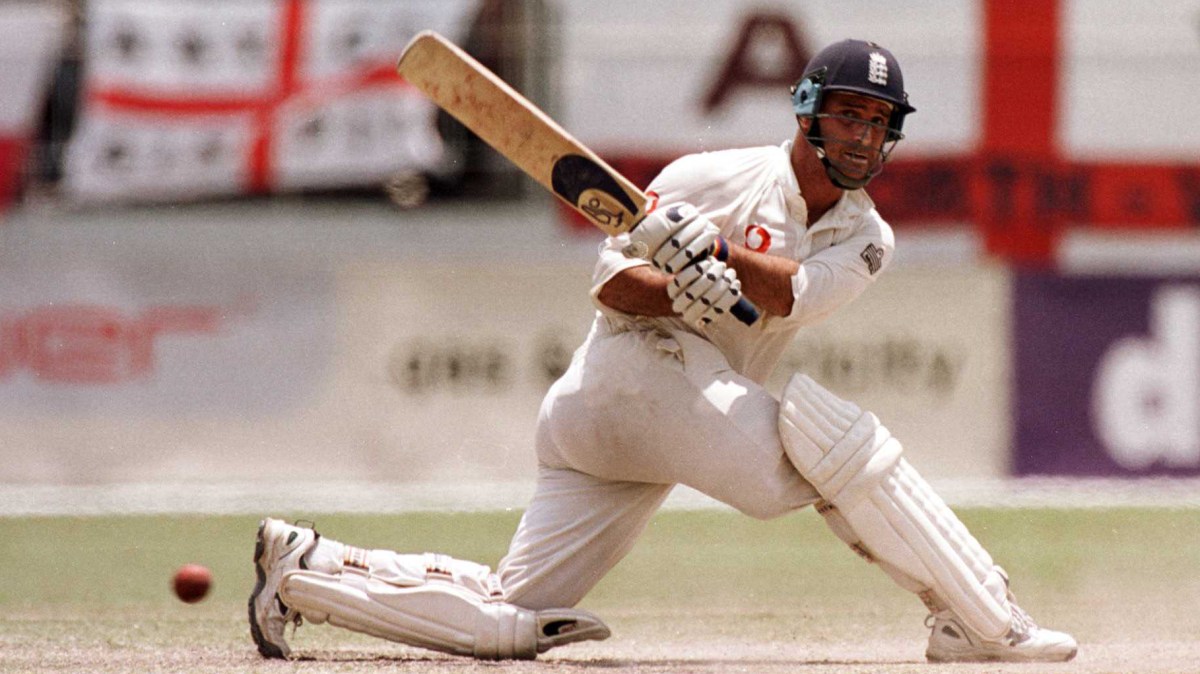Graham Thorpe was treated with ketamine in the year before his death and repeatedly missed appointments with his doctor despite being at “high risk of suicide”, an inquest has heard.
The former England and Surrey cricketer was hit by a train at Esher railway station shortly after 8.30am on August 4 last year. He was 55.
Dr Amirthalingam Baheerathan, a consultant psychiatrist who conducted 22 of Thorpe’s appointments, told Surrey coroner’s court that he felt Thorpe was a “kind-hearted gentleman” during their first meeting on October 21, 2022.
“I was a fan of him when I was growing up in Sri Lanka,” Baheerathan said. “I felt he was a legend in cricket and it was an opportunity to meet him.”
When Baheerathan first met Thorpe he had already been diagnosed with moderate depressive disorder. The inquest heard that during the time they saw each other Thorpe’s depression was “fluctuating and at some points he was severely depressed”.
• Graham Thorpe’s daughter: He loved us and his life before illness took over
Jonathan Stevens, assistant coroner, said that Thorpe missed seven of his scheduled appointments with Baheerathan and his condition had been “compounded by substance abuse”, specifically alcohol, according to the doctor’s assessment.
In the months before his death, Thorpe was living with his father but he repeatedly missed appointments with Baheerathan.
Mark McGhee, representing Thorpe’s family, read to the court a medical assessment of Thorpe’s condition that said: “Graham at times presents a high risk of suicide.
“Was he [Graham] not crying out for a face-to-face assessment?,” McGhee asked Baheerathan.
Quoting the medical notes, McGhee said it was written that Thorpe’s “lack of engagement and guarded responses make it difficult to obtain his views”.
• My friend Graham Thorpe: sensitive, warm and a wonderful team-mate
The inquest heard that Baheerathan believed that “there were no active suicide plans or thoughts at that time” but his last appointment with Thorpe at his home was on March 20, 2024, which was 19 weeks before his death.

A mural paying tribute to Thorpe at the Oval in Kennington, London
GARETH COPLEY/GETTY IMAGES
“Perhaps he needed a bit of help and the help could have come by seeing him at home?” McGhee asked the doctor.
On June 28, 2024, Katie Johnson, Thorpe’s most recent care practitioner, wrote in her assessment that Thorpe had convinced his wife Amanda Thorpe that “it is cruel to go on” and “he wants to go to Switzerland”.
“He is struggling to see the future, feels empty, lost, doesn’t see the point of being here, feels very low and frustrated,” Johnson said in her notes. She added: “He has lost everything and lost contact with people. He said he has no immediate plans to act on suicidal thoughts.”
In the middle of January 2024, there were “concerns about increased alcohol consumption” and it was recognised that Thorpe was drinking “excessive amounts of alcohol”.
However, Baheerathan told the court that Thorpe “didn’t have a dependency on alcohol” because on the “days where he was not drinking he didn’t have withdrawal symptoms” such as tremors or shakes.
Thorpe did attend sessions of Alcoholics Anonymous and engaged in its “Twelve Steps” programme.
In terms of medication, Thorpe was privately treated with ketamine between March and May 2023.
He was prescribed the antidepressant mirtazapine and the drug olanzapine, which is usually used to treat schizophrenia. Baheerathan said the latter drug had been prescribed because Thorpe “had so many negative symptoms and he was presenting with anxiety”.
He was not seen by a doctor or care practitioner in the 35 days before his death. Under cross-examination from McGhee, Baheerathan said: “I did not feel there was fluctuating risk.” Thorpe’s next appointment with the doctor was scheduled for August 9, 2024, at Baheerathan’s request.
The inquest heard that it took a while for Thorpe to build trust with his first care practitioner, Jessica Harris. However in February 2024, Thorpe’s care practitioner abruptly changed and Johnson took up the role.
Pressed on the unsettling impact of this change, Baheerathan said: “Unfortunately in the NHS retention is an issue and keeping the same care co-ordinator is a problem and we need to work with that.”
Baheerathan insisted that Thorpe did not have “an active plan” to end his life but this was questioned by the coroner. “If you listen and hear what Mrs Thorpe is saying he is constantly asking for help to end his life, that does not suggest a suicidal thought, it is asking for someone to help him carry out that suicidal thought,” the coroner said.
Baheerathan told the inquest that he still believed it was Thorpe trying to talk about his feelings.
Thorpe struck 16 Test hundreds for England, including a debut century against Australia at Trent Bridge in 1993, and represented his country 182 times in all formats.
He memorably scored the winning runs in near darkness in Karachi in December 2000, when England secured a first Test series victory in Pakistan for 39 years. He featured 82 times for the ODI side and enjoyed a 17-year career with Surrey.
He scored his final Test century under Michael Vaughan’s captaincy against South Africa in December 2004 and made his final Test appearance in June 2005 before being omitted from that summer’s victorious Ashes series.
Thorpe is due to be honoured during the second day of the fifth and final Test in the current series of England against India which takes place at The Oval — his home ground, on Friday next week. That day would have been his 56th birthday.
The inquest continues.
For confidential support, contact the Samaritans on 116 123 or visit samaritans.org

